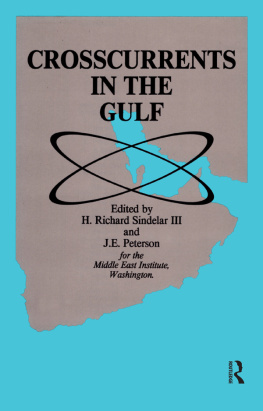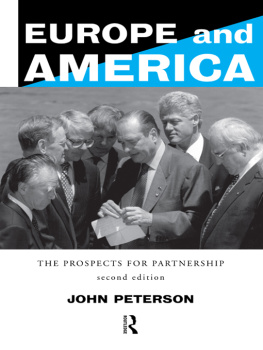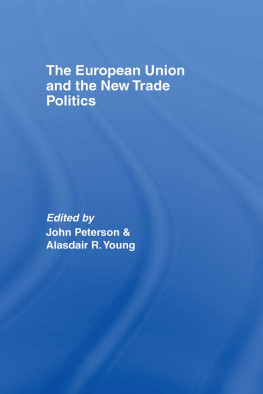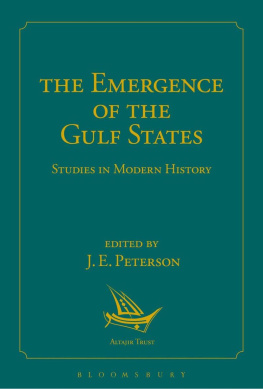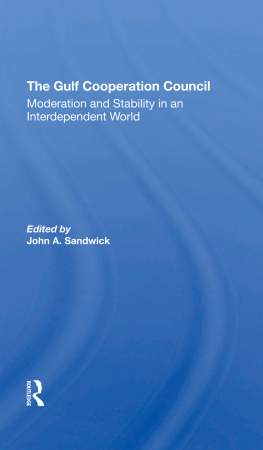CROSSCURRENTS IN THE GULF:
Arab, Regional and Global Interests
First published 1988 by Routledge
2 Park Square, Milton Park, Abingdon, Oxon OX14 4RN
605 Third Avenue, New York, NY 10017
Routledge is an imprint of the Taylor & Francis Group, an informa business
Copyright 1988 Middle East lnstitude
All rights reserved. No part of this book may be reprinted or reproduced or utilised in any form or by any electronic, mechanical, or other means, now known or hereafter invented, including photocopying and recording, or in any information storage or retrieval system, without permission in writing from the publishers.
Notice:
Product or corporate names may be trademarks or registered trademarks, and are used only for identification and explanation without intent to infringe.
British Library Cataloguing in Publication Data
Crosscurrents in the Gulf : Arab, regional
and global interests.
I. Persian Gulf. International security aspects
I. Sindelar, H. Richard III. Peterson, J.E. (John E.) II. Middle East Institute (Washington, D. C.)
327.116
ISBN 0-415-00032-7
Library of Congress Cataloging-in-Publication Data
Crosscurrents in the Gulf.
Bibliography: p.
Includes index.
Contents: Foreign policy perspectives of the Arab
Gulf States / Hermann F. Eilts - The Gulf Cooperation
Council / John Duke Anthony - Soviet
designs and dilemmas in the Gulf region / Roger F.
Pajak - [etc.]
1. Persian Gulf Region - Politics and government.
2. Persian Gulf States - Politics and government.
I. Sindelar, H. Richard. II. Peterson, John, 1947-
III. Middle East Institute (Washington, D.C.)
DS326.C76 1988 953
88-11408
ISBN 0-415-000:12-7
ISBN 13: 978-0-415-00032-1 (hbk)
DOI: 10.4324/9781315001692
Contents
Zbigniew Brzezinski
Part I: The Gulf in International Affairs
Introduction
2. Foreign Policy Perspectives of the Gulf States,
Hermann Frederick Eilts
3. The Gulf Cooperation Council: A New Framework for Policy Coordination,
John Duke Anthony
4. Soviet Designs and Dilemmas in the Gulf Region,
Roger F. Pajak
Part II: Significant Issues
Introduction
5. The Iran-Iraq War: A Challenge to the Arab Gulf States,
Wayne E. White
6. Gulf Oil Policies in the 1980s,
Joseph C. Story
7. Socio-political Change in the Gulf: A Climate for Terrorism?
Rouhollah K. Ramazani
Part III: Gulf States in Transition
Introduction
8. Omans Next Generation: Challenges and Prospects,
Dale F. Eickelman
9. Saudi Arabia and its Neighbors: Preoccupied Paternalism,
David E. Long
10. The Future of Federalism in the United Arab Emirates,
J.E. Peterson
- Part I: The Gulf in International Affairs
- Introduction
- 2. Foreign Policy Perspectives of the Gulf States
- 3. The Gulf Cooperation Council: A New Framework for Policy Coordination
- 4. Soviet Designs and Dilemmas in the Gulf Region
- Part II: Significant Issues
- Introduction
- 5. The Iran-Iraq War: A Challenge to the Arab Gulf States
- 6. Gulf Oil Policies in the 1980s
- 7. Socio-political Change in the Gulf: A Climate for Terrorism?
- Part III: Gulf States in Transition
- Introduction
- 8. Omans Next Generation: Challenges and Prospects
- 9. Saudi Arabia and its Neighbors: Preoccupied Paternalism
- 10. The Future of Federalism in the United Arab Emirates
Guide
Tables and Figures
TABLES
Table 6.1 Monthly average OPEC crude oil production
Table 6.2 Petroleum shipped through the Strait of Hormuz, 1986
Table 6.3 US imports of crude oil by country of origin
Table 6.4 US imports by source
Table 6.5 Estimated international crude oil and natural gas reserves
Table 8.1 Nationality of Sultans armed forces officers, 19801985
Table 10.1 The member states of the UAE
Table 10.2 Leadership of the UAE member states
FIGURES
Figure 6.1 Oil prices reflect international events
Map 1 Middle East
Map 2 The Gulf Region
Map 3 The Iran-Iraq war front
Map 4 Oman
Map 5 Saudi Arabia
Map 6 The United Arab Emirates
Contributors
Dr. John Duke Anthony is President of the National Council on US-Arab Relations, headquartered in Washington, D.C., and has served as a consultant to various corporations and the US Departments of Defense, State, and Treasury. He has written extensively on the Gulf Cooperation Council and has been the only American invited to attend, as an observer, each of the GCCs annual heads of state summits since the organization was founded. He received his Ph.D. in international relations and Middle East studies from the School of Advanced International Studies (SAIS) of Johns Hopkins University, and is the author, inter alia, of Arab States of the Lower Gulf: People, Politics, Petroleum (Washington: Middle East Institute, 1975).
Dr. Zbigniew Brzezinski is currently Herbert Lehman Professor of Government at Columbia University, and a Senior Advisor and Counselor at the Center for Strategic and International Studies. As National Security Advisor to President Carter from 1977 to 1981, he was the architect of the 1980 Carter Doctrine, which enunciated US policy for the Gulf region. During his distinguished career, he has been an instructor in government at Harvard University (19531960), Professor and Director of Columbia Universitys Research Institute for International Change (19601977), a Guggenheim Fellow (1960), and a Ford Fellow (1970). He has served in many capacities, some of which include Director of the Trilateral Commission (19731976), member of the State Departments Policy Planning Staff (19661968), and member of the Board of Directors of the Council on Foreign Relations. Among many awards, he was the recipient of the Presidential Medal of Freedom in 1981. He received his B.A. (1948) and M.A. (1950) from McGill University, and his Ph.D. (1953) from Harvard University.
Professor Dale F. Eickelman is Professor of Anthropology at New York University. He has conducted extensive field research in Morocco and the Sultanate of Oman, as well as elsewhere in the Middle East. His publications include Moroccan Islam (Austin: University of Texas Press, 1976; Arabic translation, 1988); The Middle East: An Anthropological Approach (Englewood Cliffs, NJ: Prentice-Hall, 1981; 2nd ed., 1988; Japanese translation, 1988) and Knowledge and Power in Morocco: The Education of a Twentieth-Century Notable (Princeton, NJ: Princeton University Press, 1985). He currently holds a fellowship from the Mac Arthur Foundation to write an anthropological study of political intelligence in the Arab Gulf.
The Honorable Hermann F. Eilts is currently Director of Boston Universitys Center for International Relations. He also serves on the Middle East Institutes Advisory Committee for the Research Center. He had a long and distinguished career in the United States Foreign Service, capping his career with stints as Ambassador to Saudi Arabia (19651970), and Egypt (19731979) during the years of Secretary of State Henry Kissingers shuttle diplomacy. He holds a B.A. from Ursinus College and an M.A. in international relations from the School of Advanced International Studies (SAIS) of Johns Hopkins University.

